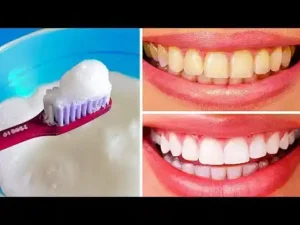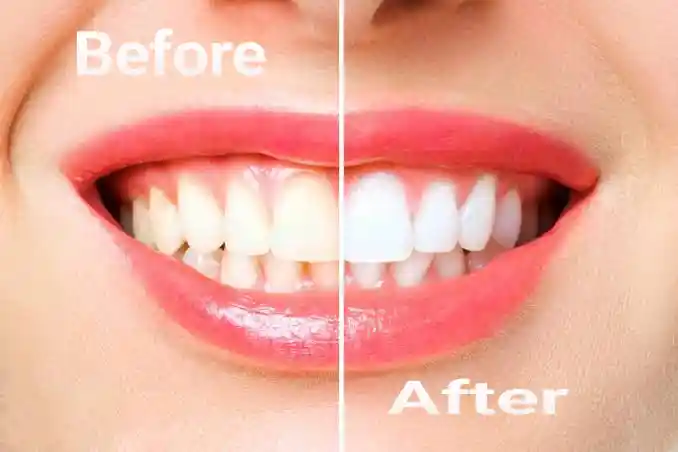A radiant, healthy smile isn’t just about brushing and flossing—it’s also about the foods you eat. Your diet plays a crucial role in strengthening your teeth, maintaining healthy gums, and achieving a naturally brighter smile. While certain foods support oral health and even whiten teeth, others can weaken enamel and cause discoloration.
In this article, we’ll explore how your diet impacts your teeth, highlight foods that promote natural teeth whitening, and answer common questions about achieving and maintaining a brighter smile.
How Your Diet Impacts Your Teeth
1. Strengthening Tooth Enamel
Tooth enamel is your teeth’s first line of defense against decay and staining. A diet rich in calcium, phosphorus, and vitamin D reinforces enamel, while acidic foods can erode it over time.
2. Preventing Cavities
While sugar is a well-known contributor to cavities, it’s not the sole culprit. Bacteria in your mouth feed on sugar and produce acid, which erodes enamel. Foods that stimulate saliva production, like crunchy fruits and vegetables, help neutralize these acids.
3. Natural Teeth Whitening
Some foods act as natural cleansers, scrubbing away surface stains or encouraging saliva flow to wash away debris. Incorporating these foods into your diet can help brighten your teeth without needing chemical whitening treatments.
4. Supporting Gum Health
Healthy gums are the foundation of a beautiful smile. Nutrients like vitamin C and omega-3 fatty acids reduce inflammation and support gum health, preventing issues like gingivitis and periodontitis.
Foods That Promote a Brighter Smile and Natural Teeth Whitening
1. Crunchy Fruits and Vegetables
Crisp fruits and vegetables like apples, carrots, and celery act as natural toothbrushes. They gently scrub your teeth while stimulating saliva production, which helps wash away food particles and plaque.
2. Dairy Products
Milk, cheese, and yogurt are rich in calcium and phosphorus, which strengthen enamel and protect against decay. Cheese, in particular, neutralizes mouth acids and stimulates saliva flow.
3. Strawberries
Strawberries contain malic acid, a natural enzyme that helps whiten teeth by removing surface stains. They are a tasty addition to your diet for maintaining a bright smile.
4. Leafy Greens
Spinach, kale, and broccoli are high in calcium and folic acid, which support enamel health and gum strength. Their fibrous texture also helps clean teeth naturally.
5. Pineapple
Pineapple contains bromelain, an enzyme that naturally breaks down stains and reduces plaque buildup, giving your teeth a brighter appearance.
6. Water
Water rinses away debris, dilutes acids, and keeps your mouth hydrated. Drinking fluoridated water can strengthen enamel and reduce the risk of cavities.
7. Green and Black Teas
Both types of tea contain polyphenols, which reduce bacteria and plaque in the mouth. Green tea also has anti-inflammatory properties that benefit gum health.
Foods and Drinks to Avoid for a Whiter Smile
1. Sugary Foods and Beverages
Candies, sodas, and sweetened drinks create an acidic environment in your mouth, leading to enamel erosion and tooth decay.
2. Acidic Foods
Citrus fruits, vinegar, and carbonated drinks can weaken enamel and make teeth more susceptible to stains.
3. Coffee and Dark Teas
While tea has some oral health benefits, dark teas and coffee can stain teeth over time. To minimize staining, rinse your mouth with water after drinking them.
4. Red Wine
Red wine contains tannins, which can discolor teeth. Its acidity also contributes to enamel erosion, making teeth more prone to staining.
5. Processed Foods
Highly processed foods often lack the nutrients necessary for healthy teeth and may encourage plaque buildup.
Natural Teeth Whitening Tips
If you’re looking to brighten your smile naturally, here are some effective tips:
1. Brush with Baking Soda
Baking soda is a mild abrasive that can remove surface stains on teeth. Mix a small amount with water or toothpaste and use it once or twice a week.
2. Use Hydrogen Peroxide
Hydrogen peroxide has natural whitening properties. Dilute it with water and use it as a mouth rinse, but avoid excessive use to prevent gum irritation.
3. Oil Pulling
Swishing coconut oil in your mouth for 10–15 minutes can help remove plaque and bacteria, promoting a brighter smile.
4. Eat Whitening Foods
Incorporate foods like strawberries, apples, and pineapple into your diet for their natural stain-removing properties.
5. Stay Hydrated
Drink plenty of water to rinse away food particles and reduce staining.
Maintaining Healthy Teeth Beyond Diet
A good diet is essential, but it should complement a robust oral hygiene routine. Dentists recommend:
- Brushing your teeth twice a day with fluoride toothpaste.

- Flossing daily to remove plaque and food particles.
- Using mouthwash to kill bacteria and freshen breath.
- Visiting your dentist for regular cleanings and check-ups.
Frequently Asked Questions (FAQs)
1. Can certain foods actually whiten teeth?
Yes, foods like strawberries, apples, and pineapple contain natural enzymes and acids that can help remove surface stains, giving your teeth a brighter appearance.
2. How does diet affect gum health?
A diet rich in vitamin C, omega-3 fatty acids, and antioxidants can reduce inflammation and support healthy gums, preventing gum diseases like gingivitis.
3. Should I avoid all acidic foods and drinks?
Not necessarily. While acidic foods can weaken enamel, consuming them in moderation and rinsing your mouth with water afterward can minimize their impact.
What is the best natural medicine for toothache
4. Is oil pulling effective for whitening teeth?
Oil pulling can help reduce plaque and bacteria, which may contribute to a brighter smile. However, it should not replace brushing and flossing.
5. Are there foods that make teeth yellow?
Yes, foods and drinks like coffee, tea, red wine, and dark-colored sauces can stain teeth over time. Limiting their consumption and rinsing your mouth after eating can help.
6. How can I prevent enamel erosion?
Limit acidic foods and drinks, brush gently with a soft-bristled toothbrush, and use fluoride toothpaste to strengthen enamel.
7. Can salt whiten teeth?
-
- Salt can have a slight whitening effect by gently abrading surface stains from teeth. However, it’s crucial to use salt sparingly and with caution.
8. How can I lighten my teeth fast?
-
- Professional teeth whitening: In-office whitening treatments using professional-grade whitening agents offer the fastest and most noticeable results.
- Over-the-counter whitening products: Whitening toothpastes, gels, and strips can gradually lighten teeth at home.
9. How can I remove yellow teeth naturally?
-
- Oil pulling: Swishing oil (such as coconut oil) in your mouth for a few minutes can help reduce bacteria and slightly whiten teeth.
- Baking soda paste: A mixture of baking soda and water can gently scrub away surface stains. However, use it sparingly as it can be abrasive.
- Fruits and vegetables: Consuming fruits and vegetables rich in fiber can help scrub teeth naturally.
10. What is the best homemade teeth whitening?
-
- There’s no single “best” homemade method. A mixture of baking soda and water, used sparingly, is a common and relatively safe option.
11. How can I whiten my teeth naturally?
-
- Maintain good oral hygiene: Brush twice daily with fluoride toothpaste, floss daily, and use mouthwash.
- Limit staining foods and drinks: Reduce consumption of coffee, tea, red wine, and dark-colored sodas.
- Oil pulling: Swishing oil in your mouth can help reduce bacteria.
- Baking soda paste: A mixture of baking soda and water can gently scrub away surface stains.
12. Can coconut oil whiten teeth?
-
- Coconut oil may have some slight whitening effects due to its antibacterial properties. However, its effectiveness is limited.
13. Can lemon whiten teeth?
-
- Lemon juice is acidic and can erode tooth enamel, potentially causing more harm than good. Avoid using lemon directly on teeth.
14. How do I whiten my teeth permanently?
-
- There’s no permanent way to whiten teeth. Whitening effects are generally temporary and require maintenance.
15. Can charcoal whiten teeth?
-
- Activated charcoal can remove surface stains, but it can also be abrasive and damage tooth enamel. Use with caution and consult a dentist.
16. What is the cheapest way to whiten your teeth?
-
- Whitening toothpastes are generally the most affordable over-the-counter option.
17. Can yellow teeth become white again?
-
- Yes, yellow teeth can be whitened to some degree. However, the extent of whitening depends on the cause of the yellowing (stains, age, etc.).
Conclusion
Your diet plays a significant role in maintaining healthy teeth and achieving a natural, brighter smile. By incorporating tooth-friendly foods like dairy products, crunchy fruits, and leafy greens, and avoiding stain-causing items like coffee and sugary snacks, you can improve your oral health and enhance your smile.
Pair these dietary habits with a consistent oral hygiene routine and regular visits to your dentist to ensure your teeth stay strong, healthy, and white. With these tips, you’re on your way to a brighter, more confident smile that reflects your overall health and vitality.






